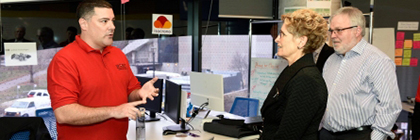Students in York University’s Lassonde School of Engineering are working to keep our food fresh longer – 20 years longer.
The student startup Lyofresh Technologies is developing a new way to freeze-dry food by manipulating the physical properties of water.
Once dry, the bacteria that causes food to spoil cannot grow, and freeze-dried foods can be stored without refrigeration while maintaining taste and nutrients for up to 20 years.
 This innovation will reduce drying times by two-thirds by integrating recent advances in semiconductor technology and software control algorithms. It is also expected to be more affordable than existing freeze-drying technology.
This innovation will reduce drying times by two-thirds by integrating recent advances in semiconductor technology and software control algorithms. It is also expected to be more affordable than existing freeze-drying technology.
The social venture has offices in the BEST Lab (Bergeron Entrepreneurship in Science & Technology) and aims to increase food security while reducing the economic, social and environmental impact of food waste.
Lyofresh was founded by Master of Disaster & Emergency Management candidate Nicholas Steele. As an interdisciplinary student, Steele has directly applied the knowledge he gained from Lassonde’s Technology Commercialization course and has obtained support from the IP Osgoode Innovation Clinic for intellectual property advising, patent filing and incorporation.
Lyofresh Technologies has been selected to participate in LaunchYU’s AccelerateUP program, and has been chosen as one of eight ventures from across Ontario to participate in the MaRS Centre for Impact Investing’s Social Venture Accelerator: Food Security.
Steele also had the opportunity to present his concept to Ontario Premier Kathleen Wynne earlier this year.
Andrew Maxwell, Lyofresh’s mentor and BEST Lab director, believes “the work being done by Nicholas and the Lyofresh team is an excellent example of using new technologies and innovative business models to find solutions to the UN’s Sustainable Development Goals to reduce food insecurity, enable a more sustainable food system and create new economic opportunities in Canada and globally.”


